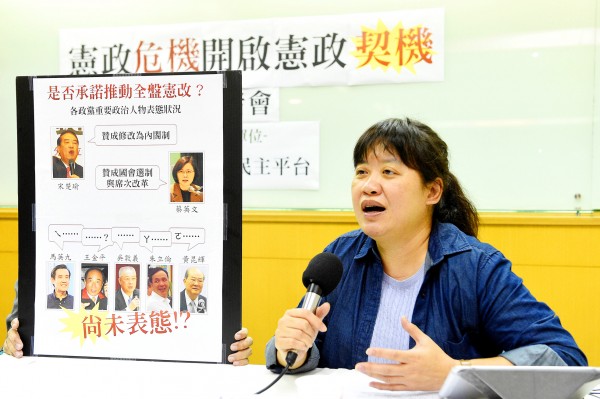《TAIPEI TIMES 焦點》 Amend constitution: watchdog

Liu Ching-yi, a National Taiwan University law professor, speaks at a press conference organized by Taiwan Democracy Watch in Taipei yesterday. Photo: Chen Chih-chu, Taipei Times
IRON IS HOT: Law professors said the nine-in-one elections provided the nation a great opportunity to tackle its constitutional challenges via wholesale legal reform
By Alison Hsiao / Staff reporter
The constitutional and political crises highlighted by the recent political upheaval in the nine-in-one elections on Saturday last week could be a turning point for long-overdue constitutional amendments, including those concerning the government institution and legislative electoral system, Taiwan Democracy Watch said yesterday.
The Chinese Nationalist Party (KMT) received a drubbing in the elections, which resulted in President Ma Ying-jeou’s (馬英九) resignation as KMT chairman and the mass resignation of Premier Jiang Yi-huah’s (江宜樺) Cabinet.
Following the political upheaval, Ma promoted Vice Premier Mao Chi-kuo (毛治國) to succeed Jiang as premier, which has “re-exposed Taiwan’s constitutional-political crisis that has existed for a long time and sparked the Sunflower movement or — even earlier — the September strife, a political feud last year between the president and Legislative Speaker Wang Jin-pyng (王金平),” said National Taiwan University (NTU) law professor Yen Chueh-an (顏厥安), who is also one of the watchdog group’s supervisors.
“A premier without a mandate being named by a president who has lost public support and trust has officially turned the Cabinet into a caretaker institution and made it even harder to discern who the real decisionmaker is and how the decisionmaking mechanism works,” Yen said.
The institution that grants the president the right to make weighty decisions that are executed by the Executive Yuan, which is accountable to the Legislative Yuan, leads to a “super-president” who has power, but cannot be held accountable in any meaningful way, Yen said.
“The selection of the Cabinet needs no approval from the legislature either, and while the president is of the same party as that holding a legislative majority, the whole executive institution could simply bypass proper procedure and the president — as party chairman — could bend party legislators to his will,” Yen added.
That a premier without a public support base was appointed by a president who no longer has the popular mandate shows that the nation’s democracy has been “temporarily suspended,” Yen said.
Chen Chao-ju (陳昭如), another NTU law professor, said that 2016 — the year of presidential and legislative elections — would be a good time to conduct a referendum to amend the Constitution.
“And if it is to be done, then a ‘defrosting’ of the Constitution — completing procedures that face an extremely high threshold to see amendments — should start now, with participation from civic groups and the public in deliberation of the issues,” Chen said.
“As the Democratic Progressive Party is most likely to be the governing party after the 2016 vote, it should propose the amendments,” said Liu Ching-yi (劉靜怡), another NTU law professor.
She called on political heavyweights, including Ma, Wang, Vice President Wu Den-yih (吳敦義), who is also acting chairman of the KMT, New Taipei City Mayor Eric Chu (朱立倫) and Taiwan Solidarity Union Chairperson Huang Kun-huei (黃昆輝), to seize the opportunity and make the changes with what would be “unprecedented good timing.”
新聞來源:TAIPEI TIMES















